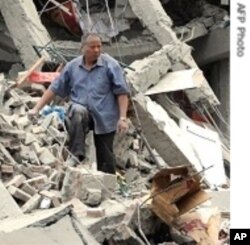Most Asian nations have put strong building codes in place to minimize destruction should a powerful earthquake hit their countries, although the codes are not always enforced.
Shoddy building practices are believed to have added to the severity of destruction in the recent earthquake in Haiti.
Asia is not a stranger to such devastation.
A 7.9 magnitude earthquake in China’s Sichuan province in 2008 resulted in the deaths of thousands of people. The collapse of school buildings killed more than 5,000 students. Parents blamed poor construction for the deaths.
Asian expert Andrew Smeall told an American newspaper that China had fairly well defined building codes, but they were not evenly enforced. Other experts suggest the codes were inadequate to protect against large quakes.
Building codes mandate the construction of structures using seismic design, which allows buildings to survive the shaking and swaying that comes with an earthquake.
Building Codes: Country By Country
Taiwan, located in one of the most seismically active spots on earth, has had strict building codes in place since the 1930’s. Codes direct builders to use reinforced concrete, deep foundation piles and seismic joints. These help to strengthen structures against the powerful earthquake motions. Most buildings in Taipei survived a quake in 1999.
In Japan, thousands of buildings were destroyed in the 1995 Kobe Earthquake. Pre-1971 buildings were six times more vulnerable to damage that those built according to current codes.
Nepal is also a seismic hotspot, but experts say it is less prepared to face a major quake. In a 2008 report, the National Society for Earthquake Technology estimated that up to 50,000 people could die if a major quake hits Kathmandu.
Wayan Sengara of the Center for Disaster Mitigation in Indonesia says there is a likelihood of a powerful 8.5 quake in his country. He says building codes should be strengthened so that structures can survive such an event.
More than 13,000 people lost their lives as the result of the Bhuj Earthquake in India in 2001. It is estimated that more than half of the country is vulnerable to such seismic events.
Bangladesh is also believed to be vulnerable to major quake damage. The nation has updated its building codes, but enforcement is believed to be lax. A Bangladesh Earthquake Society report says up to 28% of buildings in Dhaka could be destroyed should a major temblor strike the country.
The Cost of Corruption
Corrupt officials and builders are often to blame for shoddy construction. The price is paid, though, when the ground starts to shake.
Experts say Asian nations should continue to focus on enforcing their building codes to head off future disasters like the one that struck Haiti.












